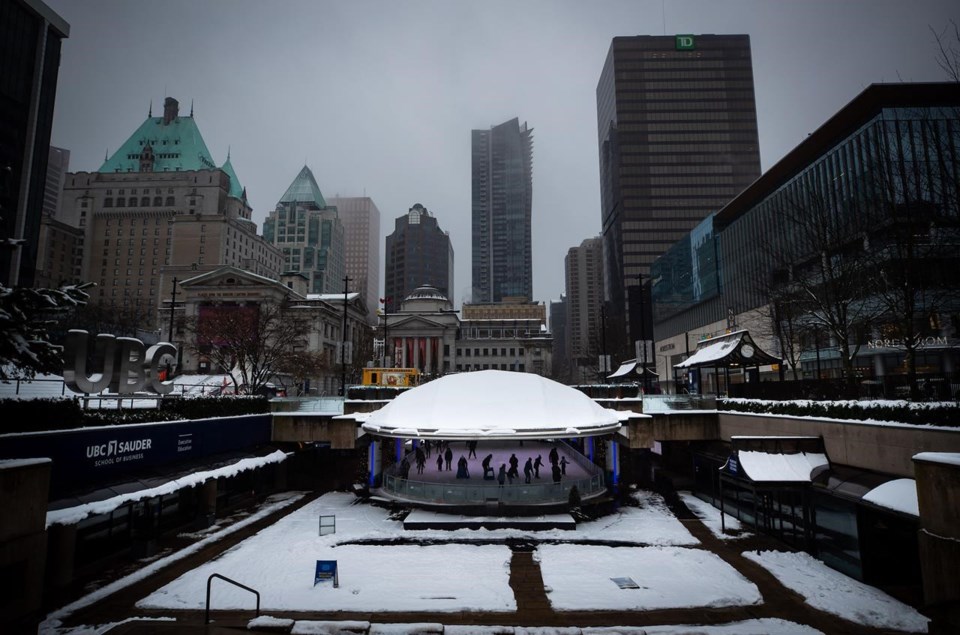VANCOUVER — Snowfall and extreme cold warnings blanketed northern B.C. Saturday, while two remote communities on Vancouver Island entered their fifth day without power due to winter storms.
B.C. Hydro president and CEO Chris O'Riley said in a statement posted on Twitter that crews were facing particularly challenging conditions repairing power lines to Tahsis and Zeballos.
Major repairs should be completed Sunday at which point the lines could be re-energized, he said, though additional work might be needed to fully restore electricity. Several major structures were damaged on the line.
"Because of its remote location, helicopter support is needed to complete repairs and our crews have been at the mercy of weather windows to be able to fly safely, all while dealing with snow shoulder deep in some areas," O'Riley said.
BC Hydro's website showed 711 customers in the communities on the northwest coast of Vancouver Island have been without power since Tuesday.
Winter storms have ravaged B.C. for the past several weeks, bringing unusual amounts of snow and frigid temperatures to places like Metro Vancouver, the Fraser Valley and Vancouver Island.
On Saturday, weather warnings were concentrated in northern B.C., while the more populous regions of southern B.C. saw less severe weather statements in effect.
"Right now we're looking at a fairly major system pushing onto the B.C. coast, but fortunately, most of the snow associated with it will stay to the north of the Lower Mainland," said Gregg Walters, a meteorologist with Environment and Climate Change Canada.
A Pacific frontal system moving northeastward brought warnings of heavy snow and extreme cold to areas like Prince George, Quesnel, the Bulkley Valley and other districts.
Environment Canada warned a frontal system near the Yukon border would push wind-chill temperatures near or below -45C.
A warning for the central coast near Bella Bella said a low pressure system would bring five to 10 centimetres of snow before turning to rain mid-day Saturday.
The special weather statements warned of snow mixed with rain in Metro Vancouver, the Fraser Valley, eastern Vancouver Island and the Sunshine Coast.
There was also a risk of freezing rain for the Fraser Valley, it said.
"That can be a little bit of a concern, but we're not going to see near the snowfall events we saw Wednesday and Thursday," Walters said.
The sustained period of cold is caused in part by Arctic air entrenched over the province's Interior that has seeped out to the coast over inlets and valleys, he added.
The agency warned drivers to prepare to adjust to changing road conditions, noting wintry weather can deteriorate rapidly.
"Public Safety Canada encourages everyone to make an emergency plan and get an emergency kit with drinking water, food, medicine, a first-aid kit and a flashlight," the warning said.
DriveBC also warned of high avalanche risk and highway closures along sections of highways 1, 3, 12, 16, 31 and 99.
The Transportation Ministry said in a statement that sections of highways 1 and 3 had been closed since Thursday due to the risk, as well as large avalanche deposits on the highway.
"Crews are working to clear the deposits after receiving clearance from the avalanche team," the statement said.
Osama Hanna said he was among many drivers stuck on Highway 1 near Hope, B.C., for several hours on Friday.
Hanna, who owns Hope Pharmacy, said he was trying to get some emergency medication to a client. He left his family in Abbotsford to make the drive even though it was the day he celebrates Christmas as an Orthodox Christian, he said.
Hanna immigrated to Canada from Egypt 12 years ago and said he has never seen so much snow.
He worried about freezing or running out of gas, without any public information about how long the road closure would last.
"When you go through something like this, you don't have somebody to tell you, this is only going to take two hours, just be calm," he said.
During the floods in November, when Highway 7 was closed due to mudslides that stranded several motorists overnight, Hanna took a helicopter to get to Hope and spent a week at the pharmacy without going home or seeing his kids.
He said he worried if he closed the pharmacy, then the hospital would be overwhelmed with demand due to a lack of walk-in clinics.
"You have an ethical obligation to go," Hanna said, adding his pharmacy serves about half the population of Hope.
"You can't just close."
This report by The Canadian Press was first published Jan. 8, 2022.
Amy Smart, The Canadian Press


